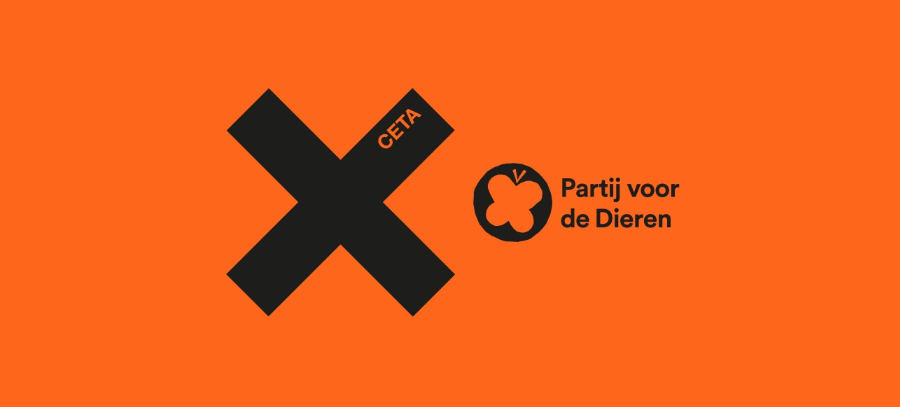الحزب من أجل الحيوانات يصوت ضد اتفاقية التجارة الحرة CETA

صوت الحزب من أجل الحيوانات يوم 15 فبراير 2017 في البرلمان الأوروبي ضد CETA اتفاقية التجارة الحرة المثيرة للجدل. فحسب عضوة البرلمان الأوروبي آنيا هازكامب تجلب اتفاقية التجارة الحرة بين أوروبا و كندا سلبيات مثبتة للإنسان، الحيوان والبيئة.
وهكذا سيرتفع معدل استيراد اللحوم الكندية عن طريق CETA، بسبب العفو عن الرسوم الجمركية على المنتجات الزراعية إلى حد كبير. ما يعتبر أخبارا سيئة للحيوانات، لأن معايير الرفق بالحيوان في كندا هي أقل مما هي عليه في أوروبا ومعظمها تطوعية في الأساس.
تقول هازكامب: “من خلال استيراد معاناة الحيوانات من كندا، تكون مسألة رعاية الحيوانات تحت المزيد من الضغط في أوروبا. الفلاحون الأوروبيون يواجهون منافسة غير عادلة من كندا، ما يقوّض الدعم لقواعد الرفق بالحيوانات. ويتم إضافة إلى ذلك الإعفاء عن الرسوم الجمركية على استيراد الحيوانات الحية، ما يؤدي إلى المزيد من تنقل الحيوانات. بسبب CETA سيقطع عن قريب العديد من الحيوانات نصف العالم”.
ويشير الحزب من أجل الحيوانات كذلك إلى تأثير الشركات متعددة الجنسيات لـ CETA على التشريع الأوروبي. “ستكون هناك تشاورات بصفة منتظمة بين بروكسيل و كندا، حيث سيحصل لوبي الصناعة على حرية مطلقة. كذلك تحصل الشركات الأجنبية على إمكانية – خارج القانون العادي – مقاضاة الحكومات بسبب قرار حكومي عمل على عرقلتها. وبذلك تكون CETA غير ديموقراطية وتجعل الأمر صعبا أمام القواعد الأوروبية أو الوطنية لحماية الإنسان، الحيوان والبيئة”.
وختاما يشير الحزب من أجل الحيوانات إلى العواقب الإجتماعية لهذه الإتفاقية. وفقا لـ آنيا هازكامب :” تدل حسابات على أن CETA ستؤدي إلى فقدان 204 آلاف منصب شغل في أوروبا. وقد أكدت لجنة العمل والشؤون الإجتماعية ذلك.
هولندا تريد رفع صيد الحوت الغير قانوني لليابان

The Party for the Animals voted against the controversial free trade agreement CETA in the European Parliament on the 15th of February 2017. According to MEP Anja Hazekamp, the free trade agreement between the EU and Canada will have demonstrable negative effects on people, animals, and the environment.
For example, CETA will increase the import of Canadian meat because the import duties on agricultural products will largely be abolished. And that is bad news for animals because the animal welfare standards in Canada are much lower than in Europe and are mostly on a voluntarily basis.
“The import of animal suffering from Canada will put further pressure on animal welfare in Europe too. European farmers will have to face unfair competition from Canada, which will undermine the support for animal welfare regulations in Europe. Furthermore, also the import duties on live animals will be abolished which will increase animal transports. Because of CETA, even more animals will be moved all over the world,” according to Hazekamp.
The Party for the Animals further points out that CETA will give multinationals more influence on European legislation. “Consultations between Brussels and Canada will take place even more frequently, giving free rein to the industrial lobby. Regulations that are needed to protect public health, animals, and the environment will be implemented less quickly if they impair free trade. Also, foreign companies will have the opportunity to sue governments – outside jurisdiction – if a government decision has a negative effect on them. This makes CETA undemocratic, causing it to be more difficult to protect people, animals, and the environment by European or national rules.”
Finally, the Party for the Animals points out the social consequences of the free trade agreement. “According to calculations, 204 thousand of jobs will get lost in Europe because of CETA. The Committee on Employment and Social Affairs of the European Parliament has confirmed this. The Party for the Animals will stand up for people, animals, and the environment in Strasbourg on Wednesday and will reject CETA,” according to Anja Hazekamp.